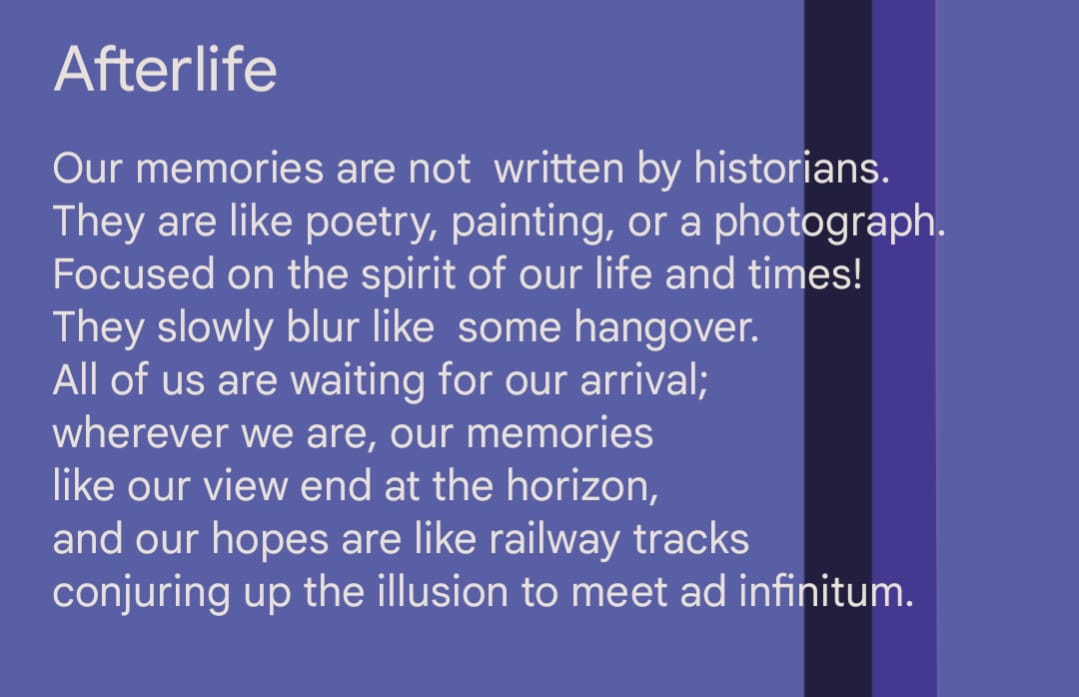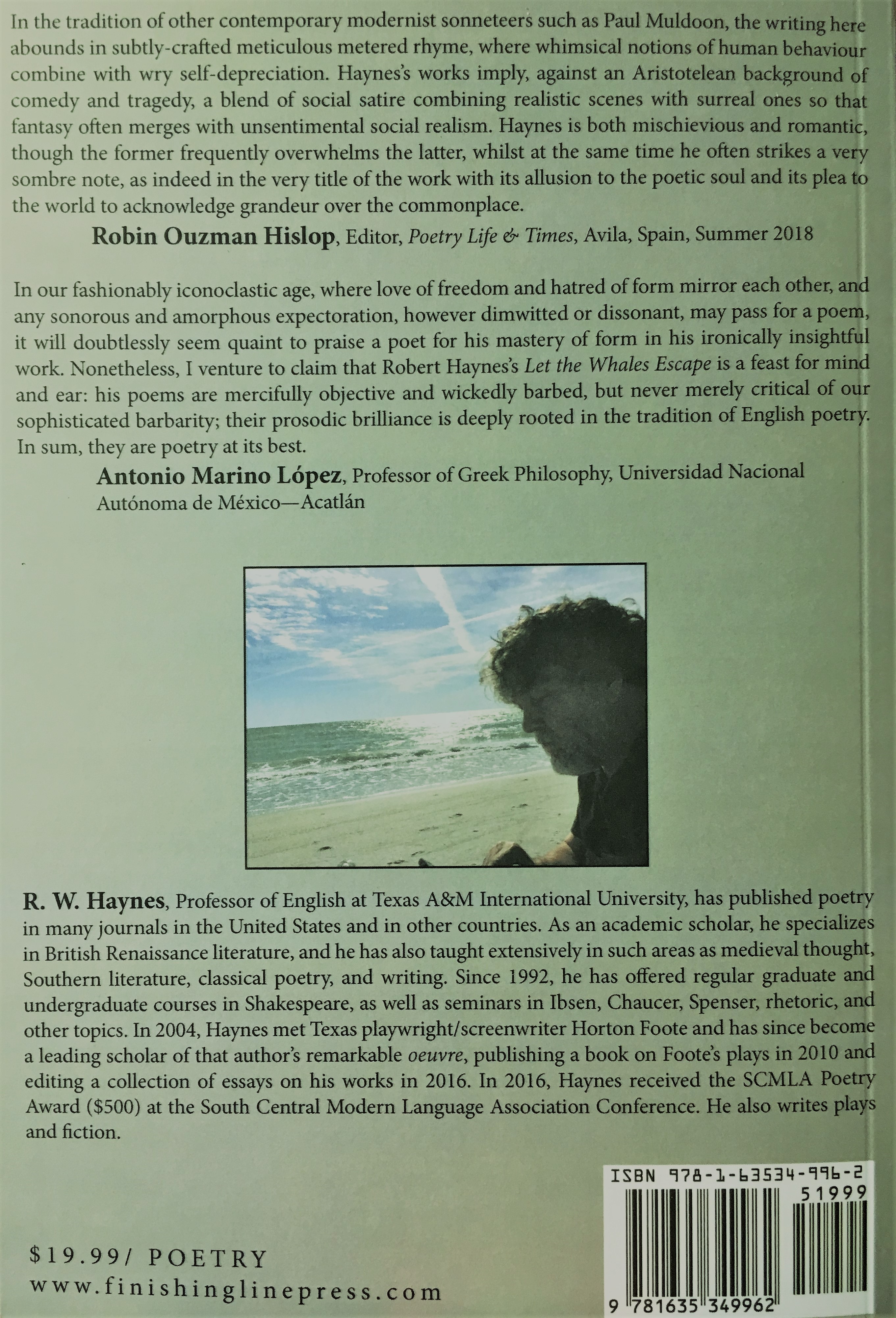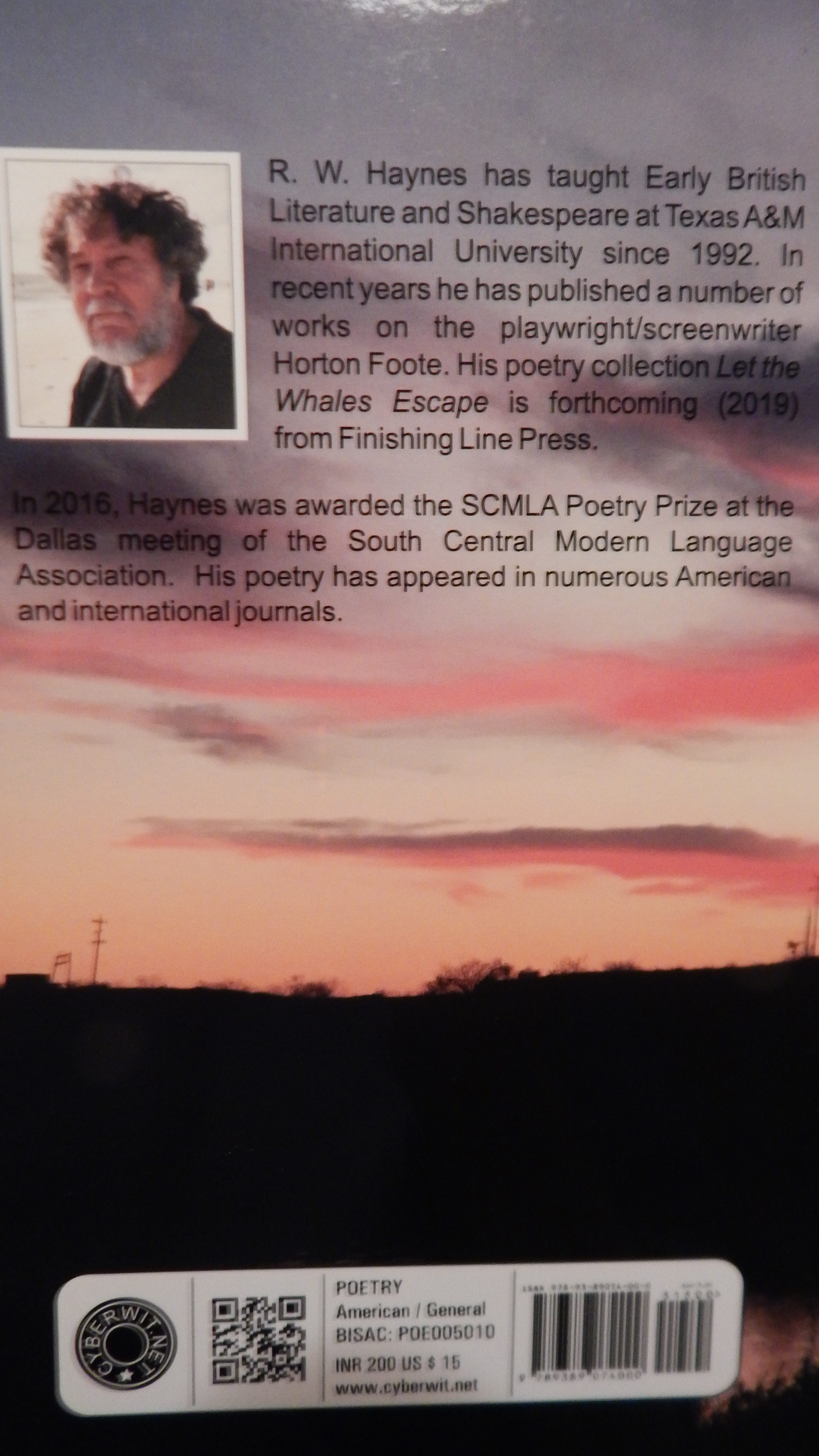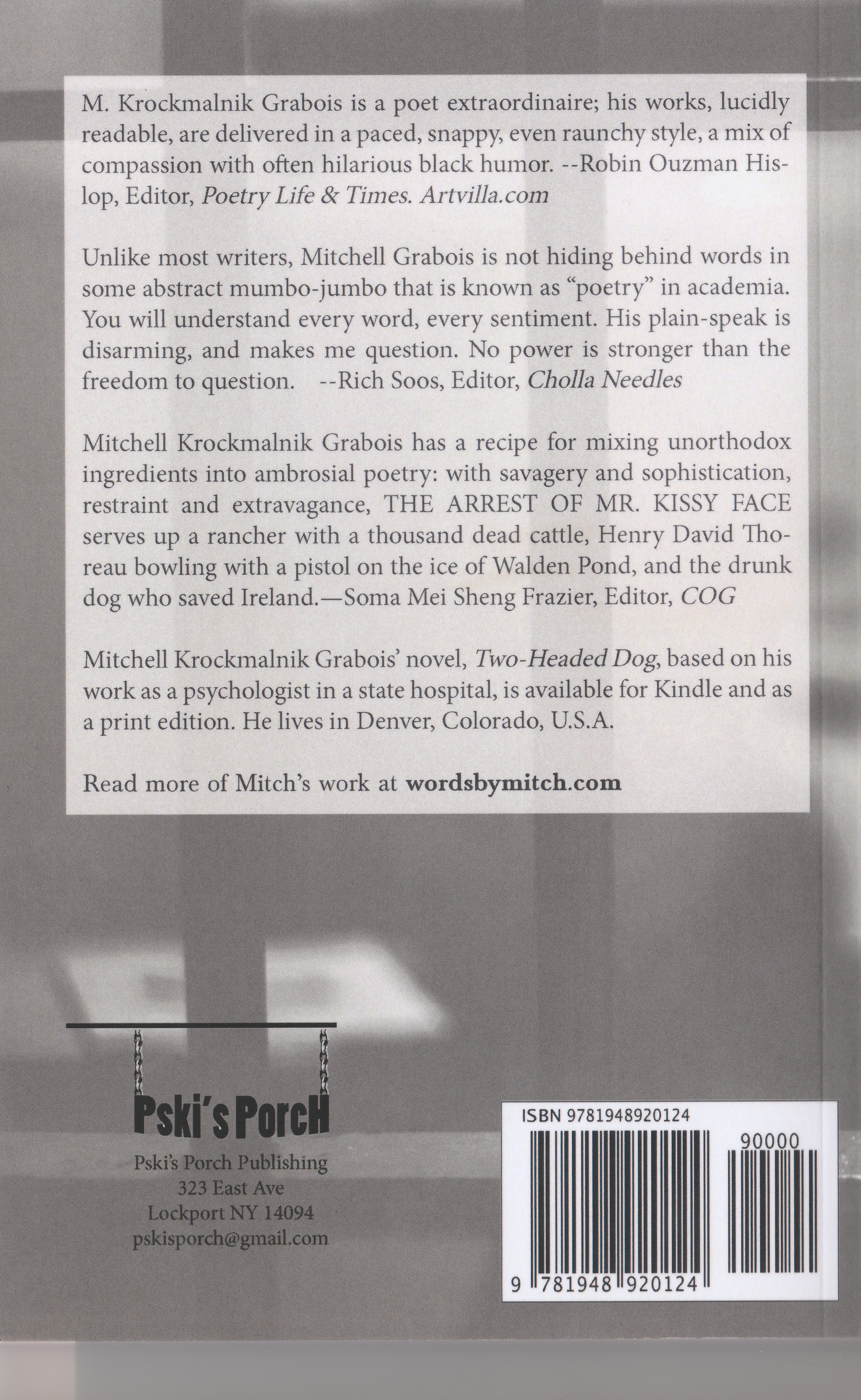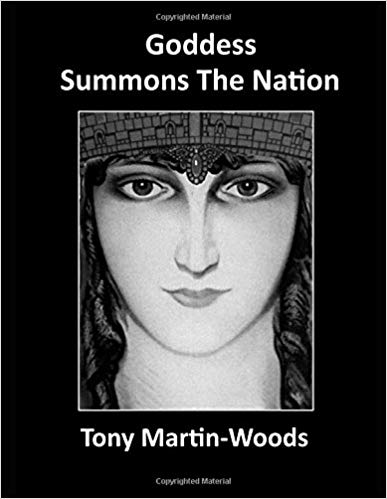
Debashish is a machine learning scientist, who has been published in literary magazines several
times across the globe, including Poetry Life & Times, where he was interviewed twice.
He is currently contending with a severe writer’s block spanning a decade, when he has hardly
produced any publishable content. He is also losing emotional connection with his own work
gradually, and spends more time to edit/tighten his old poems than creating any new content.
Announcements
I Think My Cat Pi Chi. Poem. Excerpt from Moon Selected Audio Textual Poems by Robin Ouzman Hislop
http://www.aquillrelle.com/authorrobin.htm
i think my cat pi chi is dying he's very neurotic not his usual self anymore weak scruffy following me closely look at his eyes he knows when a cat dies nobody takes him out it's always been hard seeing death around so tell me it gets worse we're gonna sit it out because you choose me purr a bit stack it it's catastrophic my little wild sniffer would you like to sky rocket into the abyss of death with me float in outer space amidst the dead stars knowing there were forever galaxies beyond reach beyond this miniscule bubble we call life there where there's only the wilderness of the dead shall we blow as some stray bacteria on a magnet comet to implode as if on a planet's barren plain to rise to flourish again in the frenzy of the stadium where they buy & sell the moment where Samson pulls down the walls where Goliath topples and cities turn to salt gladiatorial epic scenarios lunacy of the bloodbath the aftermath a scared dancer in clown's mascara darts to & fro disappears lost we sit in the audience sweat our fate betrayed the mockery of doom i cross the bridge but not the sea walk down the avenue under the screen where highways stagger their junk where the last card played is fake & the 2nd coming's a dystopian banality groping a theme to go soap then the music children from the valley of the blind craving the nourishment of adulation when you get your eyes cleaned out there's no call of the wild only a wild call the naked gaze
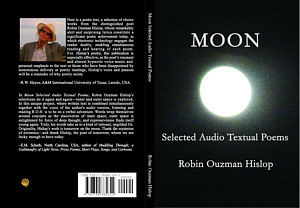
Robin Ouzman Hislop is Editor of Poetry Life and Times ; his publications include
All the Babble of the Souk , Cartoon Molecules and Next Arrivals, collected poems, and the recently published Moon Selected Audio Textual Poems, as well as translation of Guadalupe Grande´s La llave de niebla, as Key of Mist and the recently published Tesserae , a translation of Carmen Crespo´s Teselas.
You may visit Aquillrelle.com/Author Robin Ouzman Hislop about author. See Robin performing his work Performance (University of Leeds)
Press Release Let the Whales Escape Collected Poems by RW Haynes
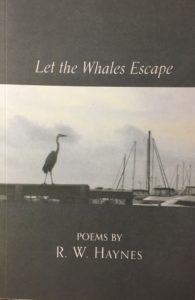



Let the Whales Escape R.W.Haynes
Mona Lisa and the Marlboro Man
Not knowing if wisdom would impulsively fly
Or if it dragged its feet when impulse flared,
She had to make the call and suddenly try
To do what an immortal would have dared,
An Aphrodite, ascending in a flying cart
Drawn by fifty gurgling pigeons at a speed
Which matched the speed of her own matchless heart
And the heartbreaking glory of her need.
Later, back in Laredo, she would say
She didn’t know why she’d taken off that way,
Smiling with satisfaction, recalling when
Her best moments flew by delightfully then.
He didn’t want anyone saying, “Oh.
This is how I feel,” but people do
Say that, and he said it, sometimes, too,
In unguarded moments, and he would show
How he felt, displaying great disdain
As he lit his pipe, blew blue smoke forth
Delivering himself from aesthetic pain
Incurred by foolish ideas from the North,
And, nodding slightly to appreciate
A tolerable turn of phrase which he
Thought suggested some brain activity,
He let his tobacco counter-obfuscate
Suspicious overflows of raw emotion
Which threatened to undermine devotion.
On the Balcony of the Palacio de Cortés
Madness stands at one elbow. At the other
Various figures in masks take their turns,
And all whisper steadily, one after another,
Syllables whose content one never learns.
The maniac is familiar; one keeps a careful eye
On him night and day, and day and night,
But who are the others who are standing by,
And what are these advisements they recite?
I dream the lonely ghost of love is one
Whose only consolation is to speak of sin,
And when that sad companion is done,
I hear Complacency, Madness’s mad twin.
I listen in patience, fighting back the fear
I’ll never hear the voice I hope to hear.
Ibsen on the Nile
Those monuments are monuments merely
Of themselves; this river of nutrition
And death, inundating Egypt, is clearly
A muddy embodiment of time’s volition.
I saw the Sphinx off in the distance. Today
I purchased an ancient mummified hand
To give to my wife, safely far away,
And I suspect that she will understand.
I met DeLesseps recently. He and I
Have much in common, more than he knows;
My work is lonelier, but there exists a tie
Between what we do as humankind grows.
These monuments record the vanity of ages;
Mine put the outraged human soul on stages.
Robin Ouzman Hislop is Editor of Poetry Life and Times ; his publications include
All the Babble of the Souk , Cartoon Molecules and Next Arrivals, collected poems, as well as translation of Guadalupe Grande´s La llave de niebla, as Key of Mist and the recently published Tesserae , a translation of Carmen Crespo´s Teselas.
You may visit Aquillrelle.com/Author Robin Ouzman Hislop about author. See Robin performing his work Performance (University of Leeds)
Collected Poems Laredo Light by RW Haynes Press Release
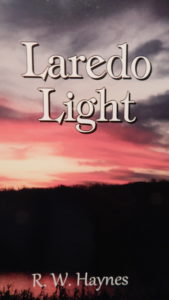



We are pleased to introduce at PLT, RW Haynes recent volume of collected poems hailing from Laredo. It’s been our pleasure to publish a selection of Haynes’ works over the last few years, ( in case of interest view Search or Categories at this site ). He’s a poet with a canny and unique expertise in the craftmanship of the classical sonnet dating from the Renaissance poets and a master of the lyrical mode but absolutely written in contemporary vogue. At times profoundly reflective and self effacing they saunter from the wry and whimsical to the depths of inner movement, whilst harvesting at all times a spectacular vocabulary in accompaniment. Editor’s comment.
Southern Baptists Sponsor Stormy Daniels Forgiveness Tour
“It costs a lot of money to look this cheap.”
-
–Dolly Parton
Brothers and sisters, we all have turned away
From the true path, but in our faith we know
We can return, though bled half-dry, although
In pain and shame for having run astray.
Judas, too, was born a child of light.
His mother saw in him how love arrives.
His kiss would guarantee that it survives
All storminess and darkness, shining bright.
And we also betray our closest friends
And sell ourselves and them with greedy minds
Until amazing grace assures that conscience finds
We have gone chasing after stupid ends.
And now, O brethren, it has come to pass
We’ve put our money on the wrong jackass.
R. W. Haynes, Professor of English at Texas A&M International University, writes various things in prose and in poetic form. His academic specialty is 16th-century England, but much of his work lately has been on the playwright/screenwriter Horton Foote. His poetry collections Laredo Light and Let the Whales Escape are being published this summer. He recently wrote a play titled Never Claim a Kill, and he hopes to complete his novel The Songs of Billy Bonstead before Laredo cools off again. Another project in progress is an academic work currently titled The Struggling Spirit in the Plays and Screenplays of Horton Foote.
Robin Ouzman Hislop is Editor of Poetry Life and Times ; his publications include
All the Babble of the Souk , Cartoon Molecules and Next Arrivals, collected poems, as well as translation of Guadalupe Grande´s La llave de niebla, as Key of Mist and the recently published Tesserae , a translation of Carmen Crespo´s Teselas.
You may visit Aquillrelle.com/Author Robin Ouzman Hislop about author. See Robin performing his work Performance (University of Leeds)
The Arrest of Mr. Kissy Face. Collected Poems by Mitchell Grabois. Press Release
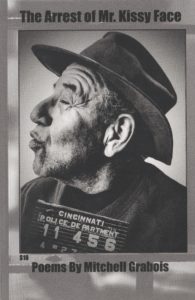



The Arrest of Mr Kissy Face Mitchel Krockmalnik Grabois
M Krockmalnik Grabois is a poet extraodinaire, his works lucidly readable are delivered in a paced, snappy even raunchy style ranging from the common place mundane social to the seedy, slapstick macabre. Much of his writing follows the genre of narrator vignettes with the inevitable turn and twist closure punch lines that amorphize a mix of compassion with often hilarious black humor. Indeed, these poems are psychotic taking us to the verge of psychopathy where they compell the reader to a confrontation of her own humanity. A provocative and very recommendable read. For further works by Mitch Grabois see and search links below: Robin Ouzman Hislop Editor Poetry Life & Times, Artvilla.com, Motherbird.com
The Arrest of Mr. Kissy Face
I kissed the woman who slices lunch meat
at King Sooper’s
She shoved smoked turkey at me
leaned away
and called: Next!
I kissed my doctor
I’d been wanting to do it
since she first told me to stick out my tongue
and complemented me on its smoothness
and the elegance of my taste buds
I kissed her and she asked
On a scale of one to ten, how have you been feeling this week?
I kissed her again
Have you been seeing or hearing things that aren’t really there?
Have you been feeling suicidal or homicidal?
I kissed her more deeply
really sent my tongue to a remote locale
Do you have access to weapons?
I said:
How can you ask me that
after everything we’ve been through?
Anyway, this is America
She called Security
Security knew me
from the days when I was a high school football star
and an amateur boxer and cage fighter
who went by the moniker Destructo
They were afraid of me
called the cops
warned them: Be sure to bring your stun guns
your billy clubs
and chemical weapons
The first cop who entered the room—
I kissed her
She yelled FREEZE!
Hands where I can see them!
Get down on your knees!
I happily complied

Mitchell Krockmalnik Grabois
Mitchell Krockmalnik Grabois has had over fourteen-hundred of his poems and fictions appear in literary magazines in the U.S. and abroad, including quite a few in POETRY LIFE AND TIMES. He has been nominated for numerous prizes, and was awarded the 2017 Booranga Writers’ Centre (Australia) Prize for Fiction. His novel, Two-Headed Dog, based on his work as a clinical psychologist in a state hospital, is available for Kindle and Nook, or as a Print Edition . To see more of his work, google Mitchell Krockmalnik Grabois. He lives in Denver.
Robin Ouzman Hislop is Editor of Poetry Life and Times ; his publications include
All the Babble of the Souk , Cartoon Molecules and Next Arrivals, collected poems, as well as translation of Guadalupe Grande´s La llave de niebla, as Key of Mist and the recently published Tesserae , a translation of Carmen Crespo´s Teselas.
You may visit Aquillrelle.com/Author Robin Ouzman Hislop about author. See Robin performing his work Performance (University of Leeds)
Amparo Arróspide Reviews Goddess Summons the Nation Collected Poems by Tony Martin Woods
Goddess Summons the Nation Paperback
Goddess Summons the Nation Kindle Edition
Goddess summons the Nation
a book of poems written with the vocation of songs and minstrelsy, articulated in four chapters with revealing titles, Substructure, Superstructure, Demolition and Flowers. Full of irony, the poetic voice, which is an ethical, indignant voice, wants the written script to transcend in spoken writing (The grapes / don’t die / in the vineyard / with the harvest / in the summer. // They transcend / and translive / victorious / in the wine, // like the poem in the song … ). This book talks to the reader in short, concise verses, with lexicon of the perspective of one who stands on the brink of historical abyss (The West bleeds to death /…). To paraphrase Ezra Pound, this book has style, that is to say, limpidity, as opposed to rethoric; where the poet in dealing with his own time, sees that language does not petrify in his hands; he has prepared for new advances along the lines of true metaphor, that is interpretative metaphor, or image, as diametrically opposed to untrue or ornamental metaphor. These poems daringly address Brexit and Trump, the policy of closing borders and xenophobia, and a nation that appears personified in female allegories – I am the matriot / the highest patriot / I serve my shares / I sooth my country /…, and cyborgs who leave a planet in ruins ( his brain compressed in a zip folder / stored in a private cloud // No memories / just data / …), our own planet from which figs also flee (with millions of figs like me, like you / away from a supernova / of stupid national greed / … ). In one poem, Time to leave Brexit, we can also read the condensed intention of the book: I’ve never been an island, / Nor a chunk of it. / I could never be one / Cause I’m a social being / made of flesh / And emotions. Images of flesh and bone, and emotions that readers will share.
Editor’s Note: see also Artvilla.com Goddess Summons the Nation. By Tony Martin Woods.
Goddess summons the Nation
un poemario escrito con vocación de cancionero y de mester de juglaría, articulado en cuatro capítulos con títulos reveladores, Substructure, Superstructure, Demolition y Flowers. Pleno de ironía, la voz poética, que es una voz ética, indignada, y que pretende que la escritura escrita trascienda en la escritura hablada (The grapes/don´t die/in the vineyard/with the harvest/in the summer.// They transcend/and translive/victorious/in the wine,// like the poem in the song/…). Se interpela al lector en versos breves, concisos, con léxico de nuestro tiempo y una temática actual de quien se sitúa al borde del abismo histórico (The West bleeds to death/…). Parafraseando a Ezra Pound, este es un libro con “style, that is to say, limpidity, as opposed to rethoric”, donde el poeta “in dealing with his own time, sees to it that language does not petrify in his hands; he has prepared for new advances along the lines of true metaphor that is interpretative metaphor, or image, as diametrically opposed to untrue or ornamental metaphor”. Los poemas se atreven con el Brexit, con Trump, con la política de cierre de fronteras y xenofobia, con una nación que aparece personificada en alegorías femeninas – I am the matriot/ the highest patriot/ I serve my shares/ I sooth my country/, y con cíborgs que abandonan un planeta en ruinas (his brain compressed in a zip folder/stored in a private cloud// No memories/just data/…), planeta del que también huyen los higos ( with millions of figs like me, like you/ away from a supernova/of stupid national greed/…). En uno de sus poemas, Time to leave Brexit, también podemos leer la intención condensada del libro: I´ve never been an island,/Nor a chunk of it./ I could never be one/Cause I´m a social being/made of flesh/And emotions… Imágenes de carne y hueso, y emociones que compartirán lectores y lectoras.


Antonio Martínez Arboleda:
Antonio (Tony Martin-Woods) started to write poetry for the public in 2012, at the age of 43, driven by his political indignation. That same year he also set in motion Poesía Indignada, an online publication of political poetry. He runs the poetry evening Transforming with Poetry at Inkwell, in Leeds, and collaborates with 100 Thousands Poets for Change100tpc.org/. Tony is also known in the UK for his work as an academic and educator under his real-life name, Antonio Martínez Arboleda at the University of Leeds. His project of digitisation of poetry, Ártemis, compiles more than 100 high quality videos of Spanish poets and other Open Educational Resources. http://www.artemispoesia.com/ . He is the delegate in the UK of Crátera Revista de Crítica y Poesía Contemporánea , where he also publishes his work as translator from English into Spanish. He published his first volume of poetry in Spanish, Los viajes de Diosa (The Travels of Goddess), in 2015, as a response to the Great Recession, particularly in Spain. His second book, Goddess Summons The Nation, is a critique of the ideas of nation and capitalism, mainly in the British Brexit context. It incorporates voices of culprits, victims and heroes with mordacity and rhythm. It consists of 21 poems, 18 of which are originally written in English. It is available in print and kindle in Amazon and other platforms. Editor’s note: further information bio & academic activities can be found at this link: https://ahc.leeds.ac.uk/languages/staff/91/antonio-martinez-arboleda
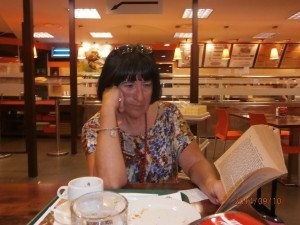
Amparo Arrospide (Argentina) is a Spanish poet and translator. She has published seven poetry collections, Mosaicos bajo la hiedra, Alucinación en dos actos algunos poemas, Pañuelos de usar y tirar, Presencia en el Misterio, En el Oido del Viento, Hormigas en Diáspora and Jaccuzzi, as well as poems, short stories and articles on literary and film criticism in anthologies and in both national and foreign magazines.
She has received numerous awards. Editor’s Note: see also Poetry, National Literature Prize 2018, Francisca Aguirre, Translated from Spanish by Amparo Arróspide & Robin Ouzman Hislop
Robin Ouzman Hislop is Editor of Poetry Life and Times ; his publications include
All the Babble of the Souk , Cartoon Molecules and Next Arrivals, collected poems, as well as translation of Guadalupe Grande´s La llave de niebla, as Key of Mist and the recently published Tesserae , a translation of Carmen Crespo´s Teselas.
You may visit Aquillrelle.com/Author Robin Ouzman Hislop about author. See Robin performing his work Performance (University of Leeds)
Blue Soul. A Poetry E Book by Gabriella Garofalo
‘The guests from the heavenly vault: stars, moon, sun, comets, feed my words and provide them with a relentless lymph. So do the many spots, and people whom I happen to stumble upon. So do fragments from conversations I happen to have overheard. My irrepressible longing for reshaping all of them in a new different life, so as to give them a fresh soul, is the drive enabling my words to be invaded by that green fuse we might think of as the very life and soul of poetry.’ (Gabriella Garofalo)
http://www.argotistonline.co.uk/Blue Soul
(P.1)
A bit of advice, blue works best if you need
To creep in on the sly, it’s the latest fad,
Peeking at the stunning shows of some wannabe star,
Nobody cares about oceans or skies –
‘Course you’re right, no bloody reason
To wake up and listen to a breathing night,
Her lips mumbling in fractured whispers
‘Please God, don’t play dirty’,
But mind, you might chance on a runner in the blue,
A soul clad to the nines who scatters across the sky
Some bright twinkling lights,
A warning sign of a blessed hour that atones for naked souls,
Buildings rising up and wild, dark curtains blocking us
From talking to hidden stars who foster no desire
For stony blindness or witty repartees –
Head to him, fear not the ashes,
The glimpse of perfection, the shades of missing time,
For he’ll shape demise into a sunny spot
Where the candles we thought snuffed out
Run back to life in silence –
And no more shades of yellow, mind,
The fire that wound words thrown to the sea –
Can’t you hear those winged voices, the blaze of memory
Inside your time when the clock strikes one
And your night pleads innocent before her looming exile:
Trust me, no help from flesh or pleas,
Teardrops of white quartz and scraps from the sea
Lie on the stones waiting for you, some gifts for you?
Stop that rubbish, girl, they’ll give you only
Infinite rooms, revolving doors, what’s autumn but a witch
Who’s shedding blood and life away?
So, does it work? I mean, the light blue fragrance
Scenting the playful writing of my pen?
Oh so sorry, I dunno and can’t even hope so.

Born in Italy some decades ago, Gabriella Garofalo fell in love with the English language at six, started writing poems (in Italian) at six and is the author of “Lo sguardo di Orfeo”; “L’inverno di vetro”; “Di altre stelle polari”; “Blue branches”, “ A Blue Soul”.
Robin Ouzman Hislop is Editor of Poetry Life and Times his publications include All the Babble of the Souk and Cartoon Molecules collected poems and Key of Mist the recently published Tesserae translations from Spanish poets Guadalupe Grande and Carmen Crespo visit Aquillrelle.com/Author Robin Ouzman Hislop about author. See Robin performing his work Performance (University of Leeds) and his latest Collected Poems Volume at Next-Arrivals
Homage to Francisca Aguirre – The Lullaby Poems (Translated from Spanish)
Francisca Aguirre, Premio Nacional de las Letras 2018 El jurado la ha elegido “por estar su poesía (la más machadiana de la generación del medio siglo) entre la desolación y la clarividencia, la lucidez y el dolor" Francisca Aguirre, National Literature Prize 2018 The jury chose it "because its poetry is (the most Machadian* of the generation of the half century) between desolation and clairvoyance, lucidity and pain" * In the tradition of Antonio Machado https://elpais.com/cultura/2018/11/13 Francisca Aguirre was born in 1930 in Alicante, Spain, and fled with her family to France at the end of the Spanish Civil War, where they lived in political exile. When the Germans invaded Paris in 1942, her family was forced to return to Spain, where her father, painter Lorenzo Aguirre, was subsequently murdered by Francisco Franco's regime. Aguirre published Ítaca (1972), currently available in English (Ithaca [2004]), when she was 42 years old. Her work has garnered much critical success, winning the Leopoldo Panero, Premio Ciudad de Irún, and Premio Galliana, among other literary prizes. Aguirre is married to the poet Félix Grande and is the mother of poet Guadalupe Grande. From "NANAS PARA DORMIR DESPERDICIOS"
LULLABIES TO LULL THROWN AWAYS
by FRANCISCA AGUIRRE
Translated by Amparo Arrospíde & Robin Ouzman Hislop ***
NANA DE LAS SOBRAS A Esperanza y Manuel Rico Vaya
canción la de las sobras, eso sí que era una nana para dormir el hambre. Vaya canción aquella que cantaba mi abuela con aquella voz que era la voz de la misericordia disfrazada de voz angelical. Porque la voz de mi abuela nos cantaba la canción de las sobras. Y nosotras, que no conocíamos el pan, cantábamos con ella que las sobras de pan eran sagradas, las sobras de pan nunca se tiran. Siempre recordaré su hermosa voz cantando aquella nana mientras el hambre nos dormía.
**
LULLABY FOR LEFTOVERS To Esperanza and Manuel Rico Well, a leftovers song, that truly was a lullaby to lull hunger to sleep. Wow, that song my grandmother sang with a voice that was the voice of mercy disguised as the voice of an angel. Because my grandmother´s voice sang for us the leftovers song. And we, who did not know bread, sang together with her that bread leftovers were holy, bread leftovers shall never be thrown away. I will always remember her beautiful voice singing that lullaby while hunger lulled us to sleep. ** NANA DE LAS HOJAS CAÍDAS A Marián Hierro Casi todo lo que se pierde tiene música, una música oculta, inolvidable. Pero las hojas, esas criaturas parlanchinas que son la voz de nuestros árboles, tienen, como la luz, el agua y las libélulas una nana secreta y soñadora. Lo que se pierde, siempre nos deja un rastro misterioso y cantarín. Las hojas verdes o doradas cantan su desamparo mientras juegan al corro. Cantan mientras los árboles las llaman como llaman las madres a sus hijos sabiendo que es inútil, que han crecido y que se han ido a recorrer el mundo. **** LULLABY FOR FALLEN LEAVES To Marián Hierro Almost everything which is lost has a music, a hidden, unforgettable music. But leaves, those chattering creatures who are the voices of our trees have -- like light, water and dragonflies -- a secret dreamy lullaby. That which is lost to us, always leaves the mysterious trace of its song. Green or golden leaves sing of their neglect as they dance their ring a ring of roses. They sing while trees call to them as mothers do calling their children knowing it is futile, as they have grown up and left to travel the world over. ** NANA DE LAS CARTAS VIEJAS Tienen el olor desvalido del abandono y el tono macilento del silencio. Son desperdicios de la memoria, residuos de dolor, y hay que cantarles muy bajito para que no despierten de su letargo. En ocasiones las manos se tropiezan con ellas y el pulso se acelera porque notamos que las palabras como si fueran mariposas quieren bailar delante de nosotros y volver a contarnos el secreto que duerme entre sus páginas. Son las abandonadas, los residuos de un tiempo de desdicha, relatan pormenores de un combate y al rozarlas oímos el tristísimo andar de los presos en los penales. ** LULLABY FOR OLD LETTERS They give off the helpless smell of neglectfulness and the emaciated tone of silence. They are memory´s cast offs, residues of pain and should be sung to in a low croon so as not to awaken them from their lethargy. Sometimes your hands chance upon them and your pulse races because we realize that words wish to dance before us as if they were butterflies and tell us again the secret sleeping inside their pages. They are the neglected, the remnants of unhappy times, recounting the details of a struggle and as we brush them we hear the saddest steps of prisoners in jails. ** NANA DEL HUMO La nana del humo tiene muchos detractores, casi nadie quiere cantarla. Muchos dicen que el humo los ahoga, otros piensan que eso de dormir al humo no les da buena espina, que tiene algo de gafe. El humo no resulta de fiar: en cuanto asoma su perfil oscuro todo son malas conjeturas: se nos está quemando el bosque, aquella casa debe de estar ardiendo. El humo es un extraño desperdicio, tiene muy mala prensa. Es un abandonado, es un incomprendido; casi nadie recuerda que el humo es un vocero, un triste avisador de lo que se nos avecina. Y por eso, cuando lo escucho vocear con impotencia yo le canto la nana del silencio para que no se sienta solo. ** LULLABY FOR SMOKE The lullaby for smoke doesn´t get many supporters, almost nobody wants to sing its song. Many say smoke stifles them, others think to lull smoke to sleep makes them queasy, that it´s a bit of a jinx. Smoke is not trustworthy: as soon as it rears its dark head it conjures up conjectures -- a forest fire, a house burning down. Smoke is a weird remain, it´s got bad reports. It´s a reject, it´s a misunderstood thing; almost nobody remembers smoke is a herald, a sad forwarner of what looms over us. That´s why, when I hear it calling out helplessly, I sing to it the lullaby for silence so that it doesn´t feel so lonely. *** Translators: Amparo Arrospide (Argentina) is a Spanish poet and translator. She has published seven poetry collections, Mosaicos bajo la hiedra, Alucinación en dos actos y algunos poemas, Pañuelos de usar y tirar, Presencia en el Misterio, En el Oido del Viento, Hormigas en Diáspora and Jaccuzzi, as well as poems, short stories and articles on literary and film criticism in anthologies and in both national and foreign magazines. She has received numerous awards. Robin Ouzman Hislop is Editor of Poetry Life and Times his publications include All the Babble of the Souk and Cartoon Molecules collected poems and Key of Mist the recently published Tesserae translations from Spanish poets Guadalupe Grande and Carmen Crespo visit Aquillrelle.com/Author Robin Ouzman Hislop about author. See Robin performing his work Performance (University of Leeds) and his latest Collected Poems Volume at Next-Arrivals
